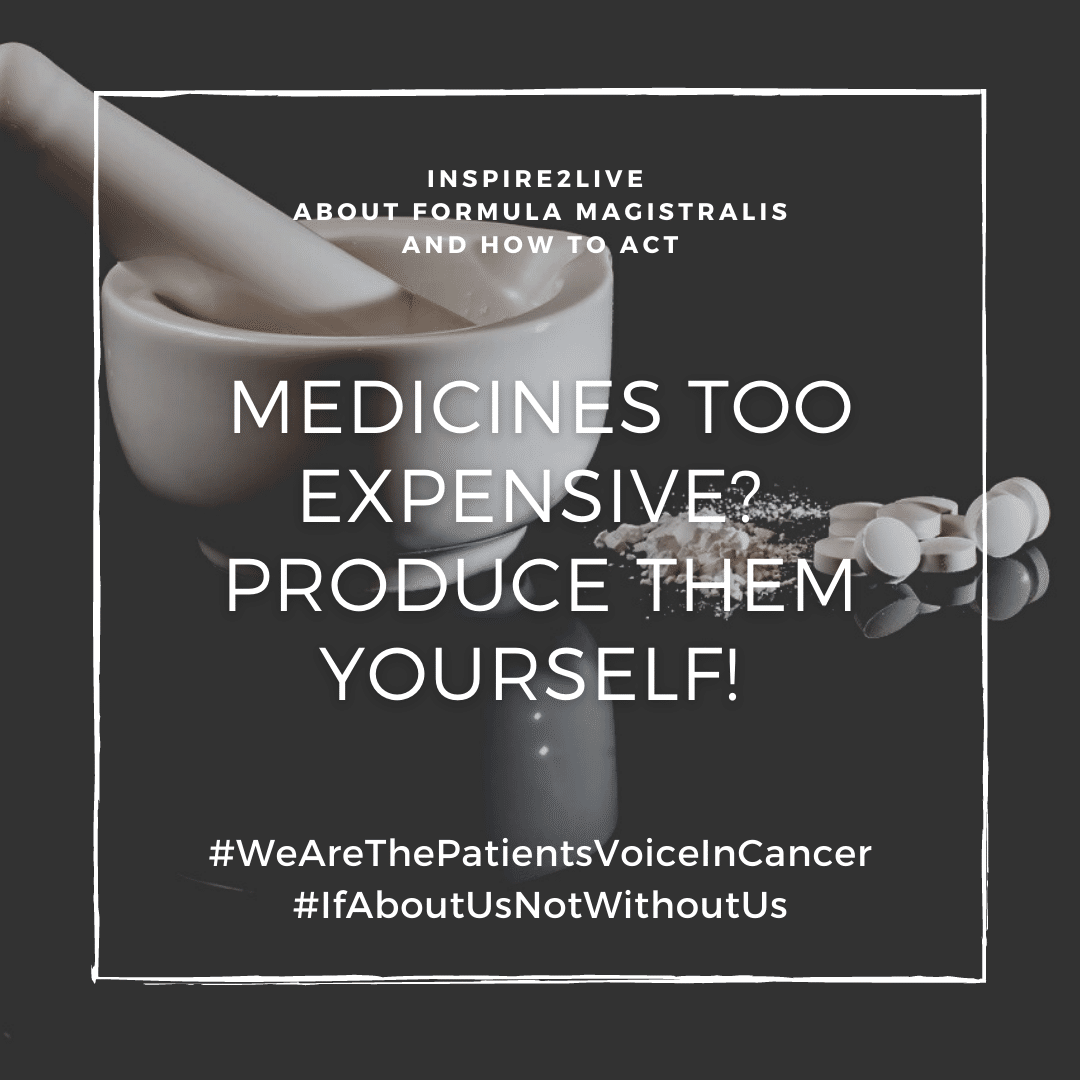In many countries and situations patients are not getting the medicines they need. For this reason, Inspire2Live has done a lot of research which we would like to share with you here. When confronted with a situation in which pharmaceutical firms are demanding extremely high prices for newly developed medicines, governments start negotiations however, during the negotiations, patients don’t have access to these medicines. Since it is Inspire2Live’s firm belief that patients should always have access to the best treatment possible, no matter where they live and no matter what the price, we started a discussion around the question: Where does the right of property (patent) end and the right of people start for access to good healthcare? By exploring the road to answer that question we came across an article in the World Trade Organisation (WTO) Agreement on Trade-Related Aspects of Intellectual Property Rights (TRIPS), which states:
Article 27 Patentable Subject Matter.
3. Members may also exclude from patentability:
(a) diagnostic, therapeutic and surgical methods for the treatment of humans or animals
However, exceptions to patent rights are limited and certain conditions have to be met as stated in Article 30 of the TRIPS Agreement: “Exceptions to Rights Conferred. Members may provide limited exceptions to the exclusive rights conferred by a patent, provided that such exceptions do not unreasonably conflict with a normal exploitation of the patent and do not unreasonably prejudice the legitimate interests of the patent owner, taking account of the legitimate interests of third parties.”
The TRIPS Agreement formed the outlines of the Regulation (EU) No 1257/2012 of the European Parliament and of the Council, implementing enhanced cooperation in the area of the creation of unitary patent protection of 17 December 2012 and of the European Patent Convention, article 53 c which states: “European patents shall not be granted in respect of: (c) methods for treatment of the human or animal body by surgery or therapy and diagnostic methods practised on the human or animal body; this provision shall not apply to products, in particular substances or compositions, for use in any of these methods”.
The Dutch government incorporated these agreements and regulations into the Dutch law on patent where art. 53 sub 3 now states “Het uitsluitend recht strekt zich evenmin uit tot de bereiding voor direct gebruik ten behoeve van individuele gevallen op medisch voorschrift van geneesmiddelen in apotheken, noch tot handelingen betreffende de aldus bereide geneesmiddelen”. This translates to: “Nor does the exclusive right extend to the preparation for direct use for individual cases on medical prescription of medicinal products in pharmacies, nor to acts relating to the medicinal products thus prepared”.
When pharmaceutical company Leadiant Biosciences hijacked the so-called orphan drug chenodeoxycholic acid (CDCA) for cerebrotendinous xanthomatosis (CTX) patients and raised the price by 500% to € 160.000 per patient per year, the Dutch Amsterdam University Medical Centre (Amsterdam UMC) started producing CDCA themselves for just € 25.000 per patient per year. This decision was held up in a court ruling based on the updated Dutch patent legislation as described above and it is just one example of how applying local legislation can support our cause to ensure that patients are getting the medicines they need.
Now what does this mean for us in our battle as patient advocates for access to the best treatment possible for all? It means that under the TRIPS Agreement and European and Dutch law, pharmacists are permitted to produce patented medicines, as long as the medication produced is prescribed by the physician for a specific patient and prepared by the patient’s dispensing pharmacist (formula magistralis). An excellent way to not only lower the costs of patented medicines, but also to bring us closer to personalised medicine.
Together with our partners, Inspire2Live is now setting up a system in which we make it possible for pharmacists to produce even more complex medication e.g. monoclonal antibody-based medicines like Nivolumab safely. By showing the medical industrial complex what we are capable of, we hope to achieve a situation in which it will be no longer profitable for them to demand extremely high prices when they introduce new medicines since hospitals and insurance companies will be able to opt for the formula magistralis way, instead of buying the official product. This way we will achieve lower prices and better access to new medicines for all patients.
Since this possibility derives from the WTO TRIPS Agreement, we would like to suggest to our fellow patient advocates worldwide that they explore the same possibilities and lobby for an alignment of local legislation with this agreement, including the exemption of magistral preparations from patent and intellectual property law.
Inspire2Live is naturally willing to cooperate and assist as much as possible wherever needed to secure the same rights for patients worldwide and timely access to the best medical care and treatments available. So if you have any questions or need any assistance to explore this solution for timely access to high-priced medicines, please don’t hesitate to contact us.
Herman Otten
Patient Advocate Public & European Affairs
E-mail: [email protected]
Mobile: +31634993562

